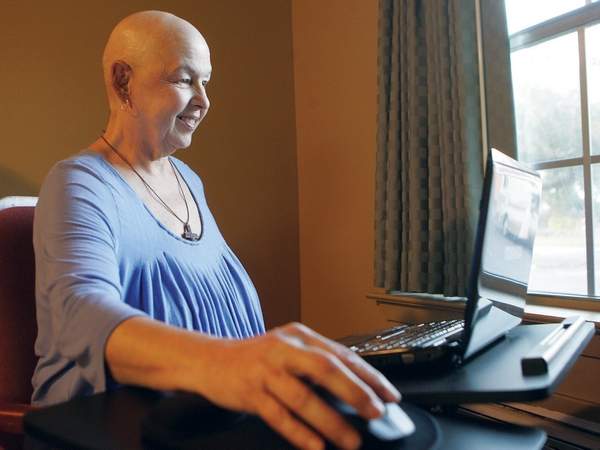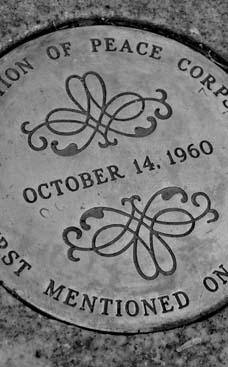
Lahme, a retired nurse who spent most of her adult life in Thibodaux, joined the Peace Corps in 2000, three years after her second husband, Winfried Lahme, died of cancer. "I was grieving very much for my husband. It was a very difficult time for me, and I just wanted to get away," she said. "There was a humanitarian element to that, but my primary purpose was to just reinvent my life somehow." She was offered a posting in Zambia working on HIV prevention and education. For two years, her home was a mud hut with a dirt floor and a grass roof that was prone to leaks. "It was overwhelming," she said. "I've never been in such a primitive environment in my life." Within two years, she had started the Luapula Foundation, which now works to promote sustainable farming, schooling for thousands of orphaned children and educates communities about how HIV spreads and kills. "It was the need I saw," she said. "My heart just went out to the children. They would come to me crying and begging not only for food but just for the opportunity to make something of themselves." Lahme's latest project is a Christmas fundraiser to buy goats for families in the province, organized through St. John Episcopal Church in Thibodaux. The animals provide milk for direct consumption or making cheese, their waste can be used as fertilizer, and they can survive what can be a harsh climate - hot and dry about half the year and soaking wet during rainy seasons.
Despite terminal illness, Zambia RPCV Linda Lahme dreams of Africa
Despite terminal illness, she dreams of Africa
By Robert Zullo
City Editor
Published: Thursday, December 23, 2010 at 6:01 a.m.
Last Modified: Thursday, December 23, 2010 at 12:40 a.m.
Caption: Linda Lahme reads an e-mail from her adopted daughter Wednesday afternoon in Maison De'Ville nursing home in Houma. Photo: Abby Tabor/Staff
HOUMA - Some mornings, she woke to the rural din of crowing roosters and the happy chatter of playing children. On others, the silence was broken by wailing women accompanying one of the funeral processions that ran through the small village almost daily. And at night, the vast sky was a sea of brilliant stars unmuted by earthbound electric light and dominated by the Southern Cross, a constellation only visible below the equator.
Linda Lahme, 64, has spent the past month lying in a bed at Maison De'Ville, a Houma nursing home.
"They tell me I'm dying of cancer," she said, "but I don't feel very dead."
In her heart and her head, she still lives in Luapula Province, Zambia, the poverty- and disease-stricken southern-African nation where she spent the past 10 years working to ensure orphaned children had a chance to go to school and eat three meals a day.
"It is the focal point of my life now," she said. "It's one of the poorest countries in Africa."
‘BEFORE I DIE'
About 45 percent of Zambia's 13.5 million people are under the age of 14, according to the CIA World Factbook. Many have been orphaned by AIDS and other diseases.
One in four people in Zambia is HIV-positive and the average income is about $1 per day, Lahme said.
Lahme, a retired nurse who spent most of her adult life in Thibodaux, joined the Peace Corps in 2000, three years after her second husband, Winfried Lahme, died of cancer. "I was grieving very much for my husband. It was a very difficult time for me, and I just wanted to get away," she said. "There was a humanitarian element to that, but my primary purpose was to just reinvent my life somehow."
She was offered a posting in Zambia working on HIV prevention and education. For two years, her home was a mud hut with a dirt floor and a grass roof that was prone to leaks.
"It was overwhelming," she said. "I've never been in such a primitive environment in my life."
Within two years, she had started the Luapula Foundation, which now works to promote sustainable farming, schooling for thousands of orphaned children and educates communities about how HIV spreads and kills.
"It was the need I saw," she said. "My heart just went out to the children. They would come to me crying and begging not only for food but just for the opportunity to make something of themselves."
Lahme's latest project is a Christmas fundraiser to buy goats for families in the province, organized through St. John Episcopal Church in Thibodaux. The animals provide milk for direct consumption or making cheese, their waste can be used as fertilizer, and they can survive what can be a harsh climate - hot and dry about half the year and soaking wet during rainy seasons.
"That's my last push before I die from cancer," she said. "They told me I'm dying. I don't believe them, but that's what they said."
‘THE MOST COMPASSIONATE LADY'
Moses Zulu was working as a environmental-health technician at a rural health center in Luapula when he was introduced to Lahme, who he called "the most compassionate lady in Luapula Province."
Lahme bicycled 35 kilometers, nearly 22 miles, to meet with him and his family.
"It was amazing," he said in an e-mail, adding that he and a colleague, Anderson Zulu (no relation), worked frequently with Lahme when she was a Peace Corps volunteer.
Moses Zulu counseled people infected with HIV, many of whom told him they worried most about who would care for their children when they died.
Lahme "immediately started to explore what we could do in the future to assist a good number of them," he said. Lahme came back from a trip to Thibodaux with about $870 in seed money, and the three started the foundation, winning grants and other financial support. Now the foundation serves more than 4,000 children and their families and its budget comes chiefly from the U.S. Agency for International Development.
"Her contribution to the foundation is so enormous," said Moses Zulu, who took over as executive director after Lahme was diagnosed with colon cancer last year. Zulu added that at one point, Lahme ran the program by herself. "She was accountant, program officer, sweeper, secretary, etc."
On the same trip back to Thibodaux that provided the seed money for the foundation, Lahme decided home was no longer in Louisiana but in Africa, a place that fascinated her even as a child growing up on a farm near tiny Cresco, Iowa.
"Every article I ever read on Africa sparked my interest. One thing that really pulls me is the joy of the people there," she said. "In spite of the deep poverty that they face, they're such joyous people. Church services there are like nothing you've ever seen - people dancing and singing and praising God with everything they have. ...I've never seen such happiness in my life."
Her sister, Charlotte Daigle, a nurse at Leonard J. Chabert Medical Center in Houma, wasn't surprised when Lahme told her she was going to Africa.
"I was glad she was doing something she wanted to do. I didn't think she'd be gone that long," said Daigle, who joined Lahme in south Louisiana after Lahme moved to the area in 1975 with her then-husband, Mike Willett. The couple later divorced.
OVERCOMING GRIEF
Much of Lahme's life has been lived in the midst of death.
Lahme had three children from her first marriage, including an infant boy named Nicholas who died of a heart condition and another, Eddy, who died of cancer before he turned 5. A daughter, Christy, now 35, lives in Seattle. When her second husband died of cancer in 1997, the cumulative burden of so much grief seemed insurmountable.
"I really didn't seem to be able to overcome it," she said. "I thought I either had to give up or do something dramatically different with my life."
In her 10 years in Africa. she saw firsthand the ravages of AIDS, malaria, cholera and starvation.
"You always knew when somebody in the village died. They would process through the village. ... Attending funerals is very much mandatory," she said. "So I attended a lot of funerals. I watched so many of my friends die of AIDS. It's such a plague and such a curse."
But surrounded by so much tragedy and heartbreak, she drew strength from the people who surrounded her and from the importance of her work.
"They accept their circumstances in a way that we never could - not having known anything else, perhaps," she said. "Many, many people don't believe that AIDS exists over there. They blame all the deaths on witchcraft."
Life in a place dominated by grim reality and intense spirituality left indelible impressions.
"The value of friendship is much more apparent," she said. "Feuds make no sense to me. Arguments make no sense to me. I think of what's important in life."
Amid so much death and suffering, she wintessed events that strengthened her faith.
"I've seen healing happen. I've seen people who were supposed to die who don't," she said. "The people have a profound faith in God. They believe in the power of prayer."
She also adopted an orphaned Zambian girl, Winnie Kunda, now a 20-year-old medical student in Russia, who she called "the light" of her life and "a shining example of determination."
After developing cancer in 2009, she went through an exhausting, sickening course of chemotherapy in South Africa and was told her cancer was fully in remission. It returned with a vengeance over the summer, spreading to her brain, lungs, liver and other parts of her body. Doctors in South Africa told her there was nothing more they could do. She returned to Louisiana in October, staying with her sister in Houma and seeking treatment until she required the constant care that a nursing home could provide.
"I came back here and I went to Chabert (Medical Center). I'm completely indigent," she said. "I have no source of income if I'm not working in Zambia."
She couldn't stand another round of chemotherapy, however, so she simply stopped. Medicaid and Social Security pay for her accommodations at Maison De'Ville.
ROUND-TRIP TICKET
Despite a terminal diagnosis, Lahme still hopes and prays.
"She's faced it the way she accomplished so much in Africa," said Anita Tully, a retired Nicholls State University English professor who met Lahme through friends who attend St. John Episcopal Church in Thibodaux. Tully is helping Lahme organize the drive to buy goats for the Zambian villagers. "She remains focused on what she could do in the precious little time that remains," Tully said.
Lahme is praying for a visa that would allow her adopted daughter to visit her bedside. She hopes locals will be generous with donations that will allow the foundation to buy goats for the villagers of Luapula.
But most of all, she is praying for a chance to go home.
"I still have my round-trip ticket. I did not come here to stay," she said. "I truly came here believing I would go home. It's expiring in March. We'll see if I'm healed by March. … My doctor tells me I'll be dead by then. Who knows? I sure don't feel like it."
WANT TO HELP?
To purchase a goat for a Zambian family, send a check for $25, marked Luapula Foundation, to St. John Espiscopal church, 718 Jackson St., Thibodaux, LA 70301. Call 447-2910 or go to www.luapulafoundation.org for information.
City Editor Robert Zullo can be reached at 985-448-7614 or robert.zullo@houmatoday.com.













